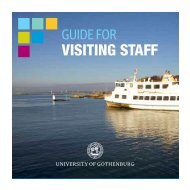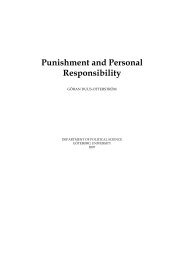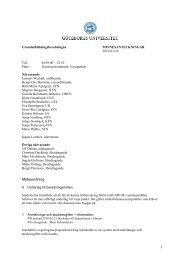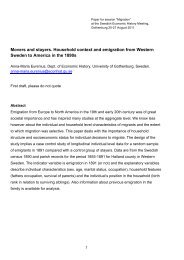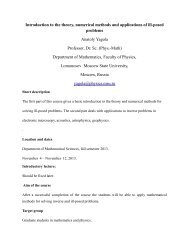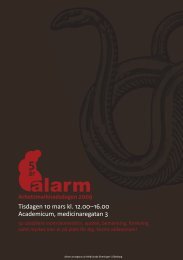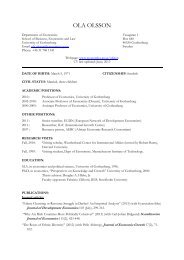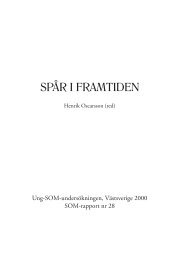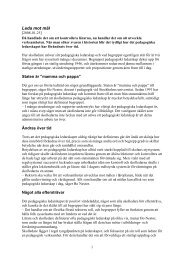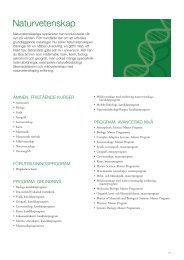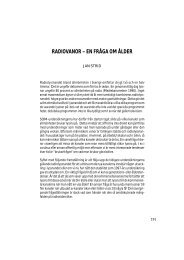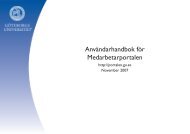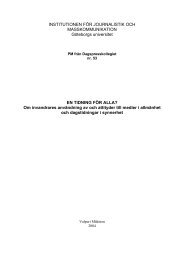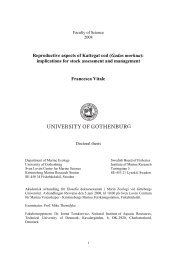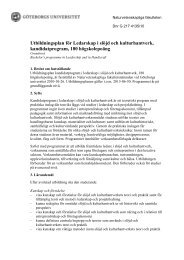development of small-scale intermodal freight transportation in a ...
development of small-scale intermodal freight transportation in a ...
development of small-scale intermodal freight transportation in a ...
Create successful ePaper yourself
Turn your PDF publications into a flip-book with our unique Google optimized e-Paper software.
is judged accord<strong>in</strong>g to the ideals <strong>of</strong> basic and narrow scientific fields, then one should also<br />
pursue the studies at a correspond<strong>in</strong>g department and, as <strong>in</strong> this case, use <strong>transportation</strong><br />
merely as one <strong>of</strong> many fields on to which one’s narrow method should be applied! As a<br />
metaphor, PICASSO proved to be a superb realistic pa<strong>in</strong>ter before becom<strong>in</strong>g a surrealistic<br />
one, but today young artists are accepted for their fresh and novel modern art rather than for<br />
be<strong>in</strong>g able to reproduce photographs. Furthermore, <strong>in</strong> the field <strong>of</strong> medic<strong>in</strong>e it is actually an<br />
acknowledged speciality to be a general practitioner!<br />
From this dissertation, it should be quite obvious that I am educated to be a generalist – I<br />
have followed the study programme <strong>of</strong> natural science <strong>in</strong> the gymnasium and that <strong>of</strong> <strong>in</strong>dustrial<br />
eng<strong>in</strong>eer<strong>in</strong>g at Chalmers. The latter programme is marketed as a programme tra<strong>in</strong><strong>in</strong>g<br />
students to bridge the differences between the pr<strong>of</strong>essional languages and scientific cultures<br />
<strong>of</strong> economists and eng<strong>in</strong>eers. Thus it is natural for me to adopt BRUNSSON’s (1982) conceptualis<strong>in</strong>g<br />
ideal <strong>in</strong> my research. The pr<strong>in</strong>ciples beh<strong>in</strong>d the ideal, however, were identified<br />
long ago by ENGELS:<br />
“In science, each new po<strong>in</strong>t <strong>of</strong> view calls forth a revolution <strong>in</strong> nomenclature.”<br />
(Friedrich ENGELS, cited by CASTI, 1994, p. 43)<br />
This ideal has also attracted attention <strong>in</strong> my research environment, for <strong>in</strong>stance applied by<br />
DUBOIS (1994) and HULTÉN (1997). The conceptualis<strong>in</strong>g ideal is by ARBNOR and<br />
BJERKE (1994, p. 147) considered as obvious to system researchers when they note that<br />
renew<strong>in</strong>g the system language is one <strong>of</strong> the ma<strong>in</strong> objectives <strong>of</strong> system research. Both ideals<br />
state that it is no primary task to generalise own theories, but rather to express them and let<br />
other researchers judge whether the new thoughts are useful. As a consequence, more attention<br />
could be paid to generat<strong>in</strong>g theories than to verify<strong>in</strong>g them, a po<strong>in</strong>t <strong>of</strong> view that, <strong>in</strong><br />
fact, also POPPER supported:<br />
“POPPER allowed that experimentation could falsify theories, but held that the real<br />
work was done when the theory was adequately articulated.”<br />
(PORTER, 1995, p. vii)<br />
There are clear parallels between the conceptualis<strong>in</strong>g ideal and the pr<strong>in</strong>ciples beh<strong>in</strong>d the<br />
World Wide Web where truly extensive <strong>in</strong>formation is made available. Yet it is up to the<br />
<strong>in</strong>dividual to search for and – not to forget – to evaluate the usefulness <strong>of</strong> the <strong>in</strong>formation.<br />
Us<strong>in</strong>g <strong>in</strong>dustrial production term<strong>in</strong>ology, it can be put as that <strong>in</strong>formation is now pulled <strong>in</strong>stead<br />
<strong>of</strong> be<strong>in</strong>g pushed by authors. Nevertheless, the 4.0 version <strong>of</strong> Micros<strong>of</strong>t’s Explorer<br />
“science”) or people represent<strong>in</strong>g the studied phenomenon. SAMUELSSON (1997, p. 4) argues that the scientific<br />
world would benefit from replac<strong>in</strong>g the terms basic and applied research with discipl<strong>in</strong>ary and transdiscipl<strong>in</strong>ary<br />
research or long-term and short-term research.<br />
25



